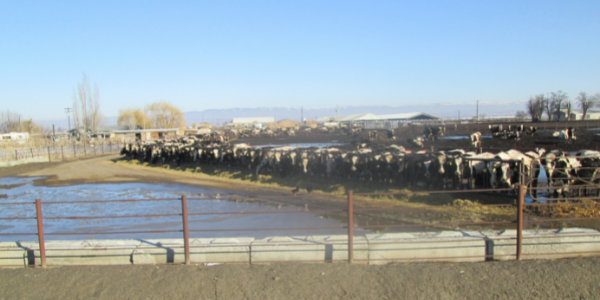
By Jean Mendoza, Sierra Club’s Water & Salmon Group and the Sierra Club’s Toxics Group member
Concentrated animal feeding operations (CAFOs) are farming operations that sequester hundreds to thousands of animals in small, unsanitary enclosures. In 2017, there were about 660 dairies in Washington State--250 of these were CAFOs. In addition to the cruelty of forcing animals to walk, eat and sleep in their own feces, there are also major environmental and public health problems associated with CAFOs.
Because the animals live so close together, disease spreads easily. This leads to overuse of antibiotics and increases in antibiotic resistant infections. This diet of antibiotics adds to the environmental cost of these operations. On an average day, a mature milk cow produces 120 pounds of manure. The manure is then collected, stockpiled and stored in lagoons until it can be spread on the land as fertilizer.
Because so many animals are concentrated in small areas, pollutants leach from the manure into the groundwater and air pollution from ammonia, hydrogen sulfide, methane, and nitrous oxide is emitted. CAFOs in the Puget Sound area have been linked to closure of shellfish beds due to bacterial pollution.
Because of their environmental impacts, many organizations have called for a moratorium on CAFOs, including the Sierra Club, the American Public Health Association, the National Association of Local Boards of Health, and the Union of Concerned Scientists.
But, until a moratorium is enacted, we have other methods of fighting back against these operations. National Pollutant Discharge Elimination System (NPDES) permits are tools used by the government to implement the Clean Water Act (CWA) on CAFOs. Unfortunately, the WA State Dept. of Ecology has struggled to write effective NPDES permits for CAFOs for decades. When prior permits expired in 2011, Ecology delayed writing new ones until 2017 and ignored an outpouring of public opinion regarding the adverse impact of CAFOs on water.
The 2017 permits were so weak that a coalition of environmental groups, including the Sierra Club, Puget Soundkeeper, Water Keepers Alliance, Western Environmental Law Center, Community Association for Restoration of the Environment, and Friends of Toppenish Creek challenged Ecology before the WA State Pollution Control Hearings Board, and then before the WA State Court of Appeals.
On June 29, the Court of Appeals ruled in our favor, listing that:
1. The permits fail to require All Known, Available, and Reasonable Technology to prevent groundwater pollution from manure lagoons and composting areas.
All Known, Available, and Reasonable Technology (AKART) is a legal term that requires any operation (municipal, industrial, or agricultural) to do everything reasonably possible to minimize pollution. In the case of manure lagoons, this means there must be liners in place that prevent pollutants from leaking into the soil and the groundwater.
2. The permits fail to prevent pollution from tile drains that seep into Washington rivers and streams.
In some parts of the state farmers install drains beneath the cropland to draw off excess water and avoid drowning the plants. Pollutants in fertilizer and manure follow the drainage. Specific limits controlling the amount of pollution that can come out of these drains or specific best management practices to reduce the discharges are necessary to protect the receiving water.
3. The permits fail to require adequate monitoring of discharges to surface and groundwater.
NPDES permits for CAFOs must address discharges when manure is spread as fertilizer. The 2017 permit assumed that simply measuring the amount of nitrate in the soil at 1-2 feet provided enough information to measure discharges. Nitrate that leaches below the root zone is no longer tested and is no longer available for use by the plants. The court ruled that the only way to truly know how much contamination reaches the aquifer is to test the groundwater.
4. The permits deny public participation in development of facility-specific nutrient management plans.
The Clean Water Act (CWA) tries to ensure that policy decisions consider the interests of the people who are affected by actions such as issuing permits. The NPDES permitting system must now require CAFOs to share their nutrient/manure management plans with the public before Ecology issues a permit.
5. Ecology failed to consider the effects of climate change in authorizing discharges to Washington waters.
One of the state responsibilities under the State Environmental Protection Act (SEPA) is to, “Fulfill the responsibilities of each generation as trustee of the environment for succeeding generations.” The court agreed that this includes addressing climate change, and that NPDES permits must follow SEPA.
As of July 29th, Ecology has chosen not to appeal this decision. This means that Ecology will rewrite the 2017 permit according to the court directive. NPDES permits are renewed every five years and a new permit is already in the planning stage, with a due date of March 2022. Ecology takes public comments on every permit they issue. This is a great opportunity to share your vision for a cleaner, safer environment. Guidelines for comments are available on Ecology’s website at https://ecology.wa.gov/Regulations-Permits/Permits-certifications/Concentrated-animal-feeding-operation
Jean Mendoza is a member of the Sierra Club’s Water & Salmon Group and the Sierra Club’s Toxics Group, as well as Executive Director for the Friends of Toppenish Creek, a Yakima Valley grassroots organization. She is a retired RN with a Masters Degree in Nursing, and advanced studies in public health.